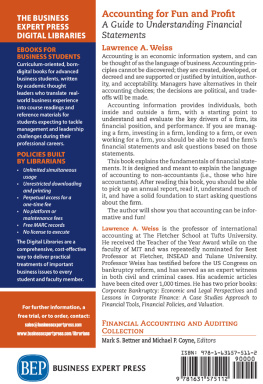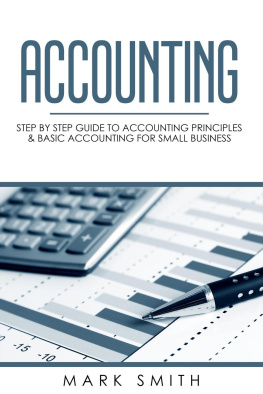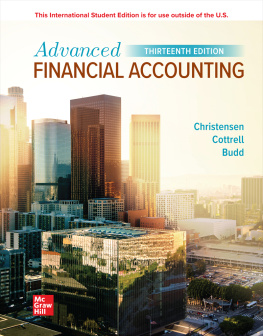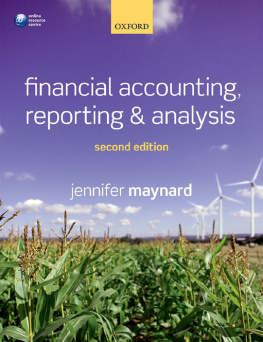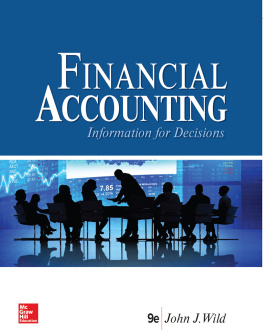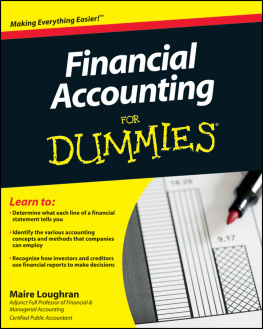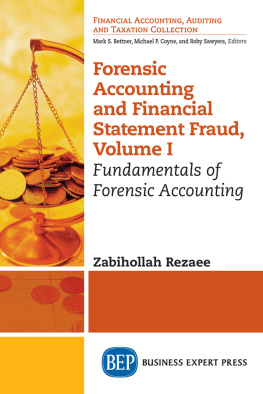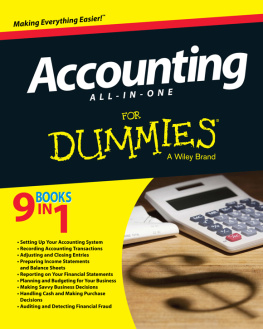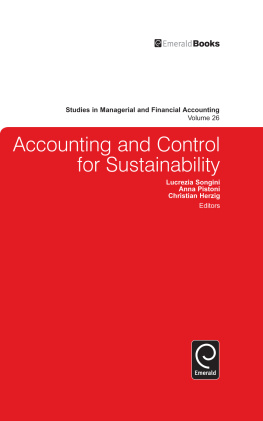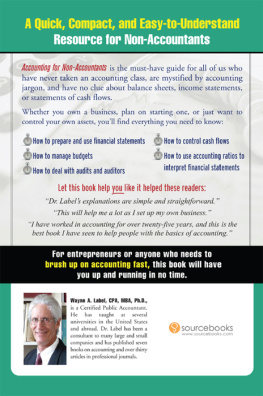Inside Accounting
For my mother and father
Inside Accounting
The Sociology of Financial Reporting and Auditing
DAVID LEUNG
University of York, UK

First published 2011 by Gower Publishing
Published 2016 by Routledge
2 Park Square, Milton Park, Abingdon, Oxon OX14 4RN
711 Third Avenue, New York, NY 10017, USA
Routledge is an imprint of the Taylor & Francis Group, an informa business
Copyright David Leung 2011
David Leung has asserted his moral right under the Copyright, Designs and Patents Act, 1988, to be identified as the author of this work.
All rights reserved. No part of this book may be reprinted or reproduced or utilised in any form or by any electronic, mechanical, or other means, now known or hereafter invented, including photocopying and recording, or in any information storage or retrieval system, without permission in writing from the publishers.
Notice:
Product or corporate names may be trademarks or registered trademarks, and are used only for identification and explanation without intent to infringe.
Gower Applied Business Research
Our programme provides leaders, practitioners, scholars and researchers with thought provoking, cutting edge books that combine conceptual insights, interdisciplinary rigour and practical relevance in key areas of business and management.
British Library Cataloguing in Publication Data
Leung, David.
Inside accounting : the sociology of financial reporting and auditing.
1. Accounting--Practice. 2. Accounting--Decision making.
3. Accounting-Case studies. 4. Corporate culture.
I. Title
657-dc22
ISBN: 978-1-4094-2049-1 (hbk)
ISBN: 978-1-3155-8870-4 (ebk)
ISBN: 978-1-3171-1622-6 (ebk-ePUB)
Library of Congress Cataloging-in-Publication Data
Leung, David.
Inside accounting : the sociology of financial reporting and auditing / David Leung.
p. cm.
Includes bibliographical references and index.
ISBN 978-1-4094-2049-1 (hardback) -- ISBN 978-1-3155-8870-4 (ebook) 1. Accounting-Socialaspects. 2. Auditing--Social aspects. I. Title.
HF5636.L48 2011
657--dc22
2011016172
Contents
List of Abbreviations
ACCA | Association of Chartered Certified Accountants |
BSA | British Sociological Association |
CIMA | Chartered Institute of Management Accountants |
FASB | Financial Accounting Standards Board |
FRS | Financial Reporting Standards |
FRS 3 | Financial Reporting Standard 3: Reporting financial performance |
FRS 5 | Financial Reporting Standard 5: Reporting the substance of transactions |
FRS 18 | Financial Reporting Standard 18: Accounting policies |
FRSSE | Financial Reporting Standard for Smaller Entities |
IAS | International Accounting Standards |
IAS 18 | International Accounting Standard 18: Revenue |
IASB | International Accounting Standards Board |
IASC | International Accounting Standards Committee Foundation |
SOP | Standard Operating Procedure |
SSAP | Statement of Standard Accounting Practice |
SSAP 9 | Statement of Standard Accounting Practice 9: Stocks and long-term contracts |
UITF | Urgent Issues Task Force |
UITF 40 | Urgent Issues Task Force Abstract 40: Revenue recognition and service contracts |
WIP | Work-in-progress |
About the Author
Dr David Leung is a Lecturer in Accounting and Finance at York Management School at the University of York in the UK, where he teaches Critical Perspectives on Accounting and Finance, and Governance and Audit. Dr Leung is himself a qualified accountant and worked as a financial controller and consultant in a number of sectors (including biotechnology, printing, financial services, tourism and retail) before joining academia. He gained his MBA at Durham University and his MSc. by research in Science and Technology Studies, and his PhD in Social Studies of Finance at the University of Edinburgh. He is a published author.
Acknowledgements
I wish to thank Professor Donald MacKenzie and Professor David Hatherly for supervising the PhD research (Leung 2008) that led to this book being written. Professor MacKenzie has been instrumental to its completion. I am indebted to him for his guidance in sociology and for the financial support provided by his Professorial Fellowship in Social Studies of Finance. Had it not been for his interest in this area, these pages would not have been written. I am also indebted to Professor Hatherly, who has been equally enthusiastic about the project. He was willing to share and endure, with a fellow accountant, the joys and tribulations of finitism and ethnoaccountancy. His knowledge and experience of accounting and auditing have ensured that the project is informed in its views. I was truly fortunate to have had them both as supervisors.
I also wish to thank Dr Ingrid Jeacle, Professor Michael Power, Professor Richard Swedberg, Professor Trevor Pinch, Dr Mike Brennan, Dr Neil Lunt, Professor Josephine Maltby and delegates at the British Accounting and Finance Association 2009 conference (University of Stirling) for their valuable advice. I am grateful to the participants in the case study for allowing me to conduct the research, especially Sara. Finally, I should thank Sufei and my family for their patience and generous support throughout the project. It would have been a difficult journey without them.
Preface
This book examines the finance department of a commercial subsidiary company of a renowned UK scientific research organization. The nine-month ethnography, which covers a one-year financial reporting cycle, addresses how accountants and non-accounting managers construct their companys earnings. Addressing issues in both internal management accounting, such as budgeting, performance evaluation and control, as well as external financial accounting and reporting, such as book-keeping, monthly/ year-end accounts and auditing, the book focuses on how people classify transactions, make professional judgements and use computer software for accounting, and prepare for and facilitate the auditing process. In tackling these questions, it also addresses accountancy training, the impact of peoples affiliations to the accounting profession or other professions on their accounting and on their perceptions of financial statements. Other contingent or contextual factors that influence the choice of accounting method such as time pressures, reward structures, management authority and institutions are also considered here.
The research uses Donald MacKenzies ethnoaccountancy concept, which employs a blend of finitist theory, as developed by Barry Barnes and David Bloor, and ethnographic practice that redresses the imbalance in relation to ethnographic studies of financial accounting, as compared to management accounting. The result helps close the gap between the academic curriculum and the experiences of practitioners. It also answers accusations that writers of academic books give insufficient attention to societal issues and that accounting research is of little relevance to and is largely ignored by accounting practitioners.
Next page

